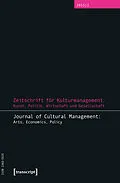Die jährlich in zwei Heften erscheinende, referierte »Zeitschrift für Kulturmanagement« initiiert und fördert eine wissenschaftliche Auseinandersetzung mit Kulturmanagement im Hinblick auf eine methodologische und theoretische Fundierung des Faches. Das international orientierte Periodikum nimmt nicht nur ökonomische Fragestellungen, sondern ebenso sehr die historischen, politischen, sozialen und wirtschaftlichen Bedingungen und Verflechtungen im Bereich Kultur in den Blick. Explizit sind daher auch Fachvertreterinnen und -vertreter akademischer Nachbardisziplinen wie der Kultursoziologie und -politologie, der Kunst-, Musik- und Theaterwissenschaft, der Kunst- und Kulturpädagogik, der Wirtschaftswissenschaft etc. angesprochen, mit ihren Beiträgen den Kulturmanagementdiskurs kritisch zu bereichern.
Das zweite Heft nimmt sich u.a. des Verhältnisses von Kulturproduktion, Kulturpolitik und Kulturfinanzierung an.
Autorentext
Steffen Höhne (Prof. Dr.) is professor for cultural management and head of the cultural management course at the Hochschule für Musik Franz Liszt Weimar.
Martin Tröndle (Prof.) is chair of cultural production at the Zeppelin University in Friedrichshafen. He is the editor of the »Journal for Cultural Management: Art, Politics, Economics and Society« and director of the Swiss National Science Foundation project »eMotion mapping museum experience«. He was a music consultant in the Lower Saxony Ministry for Science and Culture. He has received various prizes and awards for his research work.
Klappentext
The half-yearly published »Journal of Cultural Management,« following the example of the »Jahrbuch für Kulturmanagement«, initiates and supports an extensive scholarly discourse about cultural management, in view of a methodological and theoretical foundation of the field. This peer-reviewed journal aims at making it clear that cultural management is not limited to economic concerns, but should rather take into account all the historical, political, social and economic conditions and interconnections in the study of culture. Experts from neighbouring academic disciplines such as cultural sociology and policy, art studies, theatre studies, musicology, arts education and economics are addressed in order for their contributions to enrich the cultural management discourse critically.
